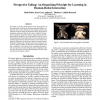1225 search results - page 11 / 245 » Design Principles for Intelligent Environments |
151
click to vote
AAAI
2006
15 years 3 months ago
2006
The ability to interpret demonstrations from the perspective of the teacher plays a critical role in human learning. Robotic systems that aim to learn effectively from human teach...
131
click to vote
VRST
2003
ACM
15 years 7 months ago
2003
ACM
Virtual Reality Art involves the design of artificial worlds that offer new experiences to spectators. An important aspect for the development of VR Art installations is the princ...
136
click to vote
CBSE
2005
Springer
15 years 7 months ago
2005
Springer
After a component based system is developed, it has to be deployed into a target environment. As the system becomes much larger and more complex and the environment becomes open an...
127
click to vote
NETGAMES
2003
ACM
15 years 7 months ago
2003
ACM
: This paper outlines the basic spatial principles of level design in multi-player first-person shooters with special reference to Counterstrike, basing itself on experiment, analy...
137
Voted
ECAL
1995
Springer
15 years 5 months ago
1995
Springer
Neither `design' nor `evolutionary' approaches to building behavior-based robots feature a role for development in the genesis of behavioral organization. However, the n...



